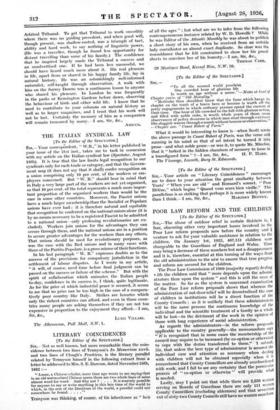THE ITALIAN SYNDICAL LAW
[To the Editor of the SPECTATOR.] SIR,—Your correspindent, " W.B.," in his letter published in your issue of the 21st inst., takes me to task in connexion with my article on the Italian syndical law (Spectator, August 24th). It is true that the law limits legal recognition to our syndicats only for each trade or category, and that the Govern- ment may (it does not say that it shall) confer recognition on a union comprising only 10 per cent. of the workers or em- ployees concerned. But "W. B." should bear in mind that in Italy a very large part of the workers are not yet organized, so that 10 per cent. of the total represents a much more impor- tant proportion of the organized workers than would be the case in some other countries. Moreover, the Fascist unions have a much larger membership than the Socialist or Popolare unions have ever had ; it is therefore natural and equitable that recognition be conferred on the national unions alone (it is by no means necessary to be a registered Fascist to be admitted to a national union—only professing revolutionaries are ex- cluded). Workers join unions for the advantages they can secure through them, and the national unions are in a position to secure greater advantages for the workers than any others. That unions should be used for revolutionary purposes, as was the ease with the Red unions and in many cases with those of the Partito Popolare, is a gross misuse of their functions.
In his last paragraph " W'. B." expresses doubts as to the success of the provisions for compulsory jurisdiction in the settlement of labour disputes. As I wrote in my article, " it will, of course, need time before final judgment can be passed on the success or failure of the scheme." But with the spirit of collaboration which animates the Italian people to-day, confidence in its success is, I think, quite legitimate. As for the price at which industrial peace is secured, it seems to me that no price can be too high in the ease of a compara- tively poor country like Italy. Strikes are luxuries which only the richest countries can afford, and even in those coun- tries many people are asking themselves if they are not too expensive in proportion to the enjoyment they afford.—I am, Sir, &c., The Athenaeum, Pall Mall, S.W. 1.
LUIGI VILLAILI.






































 Previous page
Previous page